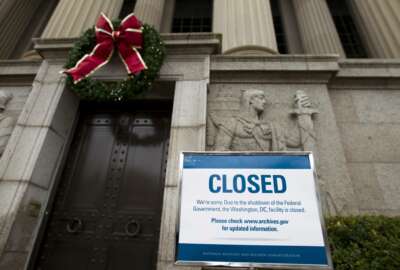 Exclusive
Exclusive  Exclusive
Exclusive Among those stuck at home are people who were about to retire or had already filed their retirement papers. Federal retirement expert Tammy Flanagan had some...
Best listening experience is on Chrome, Firefox or Safari. Subscribe to Federal Drive’s daily audio interviews on Apple Podcasts or PodcastOne.
December is historically a popular time for federal employees to retire, but last month was different. Employees who filed their retirement claims well before the partial government shutdown began on Dec. 22 have less cause for concern, but their colleagues who waited longer or changed insurance plans during open season may be in for a ruder awakening.
The Office of Personnel Management’s backlog of retirement claims decreased in December, but so did the number of claims processed. OPM recorded an inventory of 18,019 claims last month compared to 19,162 claims in November, and it processed 6,925 claims in December compared to 8,077 claims the previous month.
The agency also received fewer new retirement claims in December than in November — 5,782 versus 7,510, respectively. And the average processing time for retirement claims dropped by one day to 60, which is exactly how long it took a year prior, but federal benefits expert Tammy Flanagan said that will likely increase if you claim was not processed before the shutdown.
“There’s a delay even if there wasn’t a furlough, unfortunately, because the typical retirement processing takes about two months once the claim gets to the Office of Personnel Management,” she said on Federal Drive with Tom Temin. “But in some cases the claim hasn’t even left the agency because the employee just left at the end of December, so there may be a couple more weeks or even a month in the delay at the agency level before the thing even gets to OPM.”
That’s why she said feds who hoped to retire at the end of the year or this month should have some cash reserves to hold them over until the shutdown ends and operations resume as normal. People who left their position Dec. 31 and are expecting their first retirement check Feb. 1 will be disappointed, she forecast.
Flanagan also warned against new retirees trying to take money out of their Thrift Savings Plans to sustain them until that first retirement check arrives. If their agency had not sent over a separation notice to OPM before the shutdown that former employee cannot take a post-separation withdrawal. As part of its guidance for furloughed employees, OPM published sample letters it says can be sent to creditors to defend a fed’s lack of payment if they are struggling to keep on schedule.
Retirees in the Federal Employees Retirement System are more dependent on their TSPs than participants in the Civil Service Retirement System, Flanagan said. She added that CSRS retirees, who are mostly dependent on OPM processes should be secure so long as their claim has left their agency.
Thankfully for those older than 63 who rely on their Social Security payments, the Social Security Administration received its appropriations well before the shutdown. But the bridge payments for FERS retirees age 62 and younger can expect delays.
And for those who made changes to their health, life and/or long term care insurance plans during open season, Flanagan also had some advice.
“If that was an electronic process, your new coverage should take effect on Jan. 6. If you’re an employee, that’s the first day of the new leave year. And if you’re a retiree, your new coverage took effect on Jan. 1,” she said. “The only issue could be if your agency still does manual processing of those requests to change health insurance, and they weren’t there at the time you submitted your claim, that again will be delayed.”
New coverage will still be retroactive to the beginning of the year and can be used, but a doctor may expect the fed to pay them and get reimbursed later. This could mean feds pay their premiums out of pocket if the shutdown lasts as long as two or three months, Flanagan warned.
One bright spot in this is that furloughed time for feds still on the payroll does accrue toward retirement. It is counted as leave without pay. Flanagan advised against feds who filed retirement claims at the time of the shutdown withdrawing their applications and resubmitting them once the hubub has died down.
“If you’ve already gone past the date of your retirement you’re effectively off the payroll anyway. So I think it would be a matter of trying to get that person put back on, it could cause more problems,” she said. “Just hold on, be a little patient and it may take an extra few weeks up to a month to get things back to where they should be, but I think everything will still end up OK.”
Copyright © 2025 Federal News Network. All rights reserved. This website is not intended for users located within the European Economic Area.
Amelia Brust is a digital editor at Federal News Network.
Follow @abrustWFED
 Exclusive
Exclusive 
